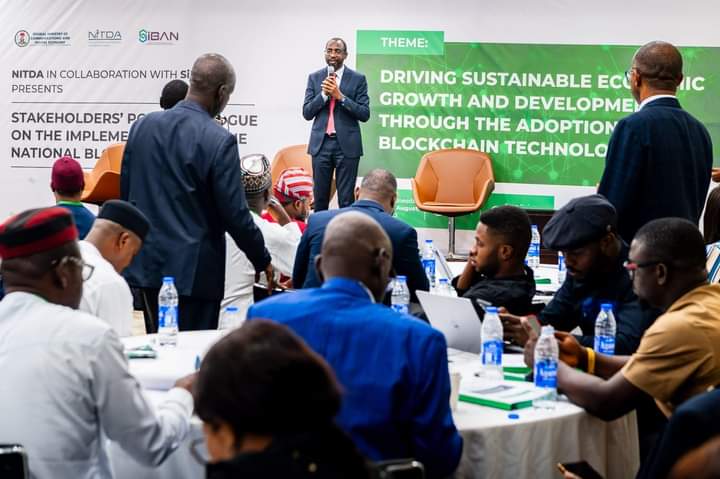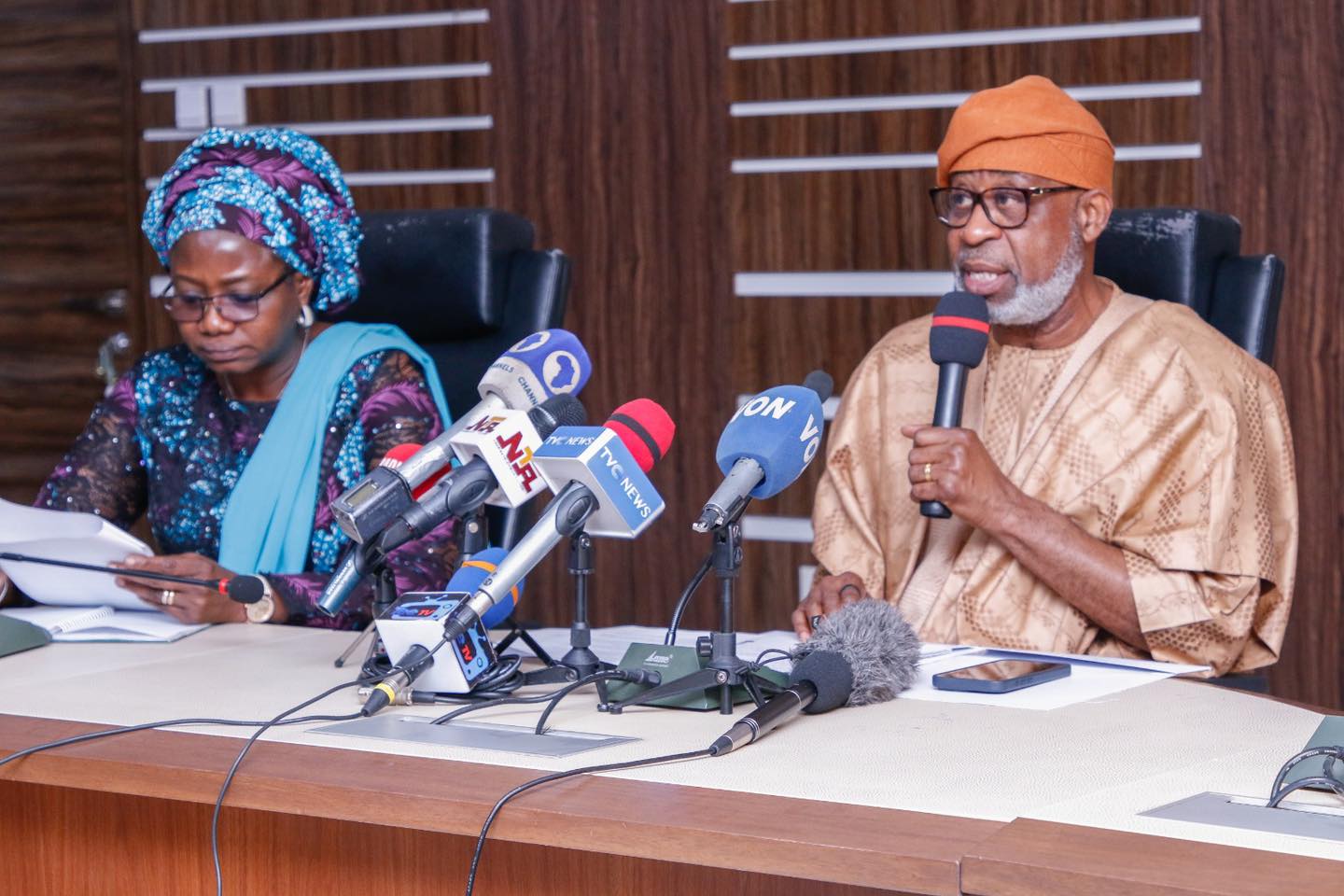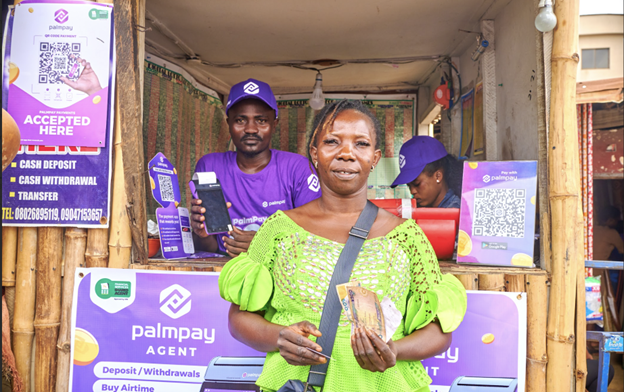The Director-General of the National Information Technology Development Agency (NITDA), Kashifu Inuwa Abdullahi CCIE has reiterated the fact that implementing the National Blockchain Policy in Nigeria will strengthen the Nation’s digital economy by expanding financial inclusion and security, enhancing openness and accountability, increasing efficiency in service delivery, and creating job opportunities.
Inuwa said this at the Policy Dialogue for the Implementation of the National Blockchain Policy which was held in Lagos.
While presenting a Keynote Address, the DG noted that the theme: “Driving Sustainable Economic Growth and Development through the Adoption of Blockchain Technology” speaks to the importance of the conversations around tech, stressing that Blockchain is a type of technology that is decentralised in nature and provides a secure way of recording and verifying information, making it trustworthy and resistant to tampering.
“As a groundbreaking advancement in the digital age, Blockchain has the potential to revolutionise our industries and could boost the global economy with US$1.76 trillion by 2030 according to research by PricewaterhouseCoopers (PwC). As a result, Governments all over the world including Estonia, Georgia, United Arab Emirates, Switzerland, and Singapore are exploring how to leverage Blockchain technology to boost innovation, improve service delivery, create job opportunities, and drive economic growth”.
“While it is commendable that we have a Policy in place to catalyse the adoption of this ground-breaking technology and we are no more playing catch-up, the National Blockchain Policy is designed to be our roadmap for the adoption of Blockchain technology in Nigeria and its adoption presents a tremendous opportunity to promote the quality of services delivered by both public and private sectors”, Inuwa avowed.
According to the DG, Nigeria is the first country to develop a Policy on Blockchain in Africa, noting that the mission for embarking on the strategic initiative is to encourage the use, adoption and integration of Blockchain technology in the various sectors of Nigeria’s digital economy, in order to increase efficiency, innovation, transparency, security, and trust.
The DG explained that the Policy identified talent development, innovation, and adoption as the key areas that Government will collaborate with relevant stakeholders to harness the potential of Blockchain technology in Nigeria with the belief that the focus on talent development will facilitate the creation, attraction, and retention of a skilled and knowledgeable workforce in the industry which will promote innovation and enhance the competitiveness of the National Blockchain ecosystem.
“We are optimistic that the focus on innovation will create an enabling environment that encourages experimentation, provide resources to support innovation, and address regulatory barriers”.
“We are resolute that the focus on adoption will lead to acceptance and application of Blockchain in financial services as well as Government and Corporate Digital Services”, the DG assured.
Inuwa who recalled that the Federal Executive Council (FEC) approved the National Blockchain Policy for Nigeria on 3rd May 2023 and directed the National Information Technology Development Agency (NITDA) to serve as the Secretariat for the purpose of implementing the policy under the supervision of the Federal Ministry of Communications and Digital Economy, said that sequel to the approval, the ministry on 16th May 2023, had also inaugurated the National Blockchain Implementation and Steering Committee consisting of twenty-six (26) relevant stakeholders from the public and private sector to serve as the governing structure for the implementation of the Policy.
The NITDA Boss confirmed that the engagement was therefore set up to facilitate the development of a strategy that will drive the implementation of the Policy, with the hope that the strategy will outline all relevant stakeholders along with their various roles and responsibilities towards the implementation of the Policy.
“The National Blockchain Policy could not have come at a better time as the talent development and innovation focus areas of the Policy aligns perfectly with the manifesto of the current administration to create 1 million jobs for Nigerians through digital economy”.
“We are not unmindful of the fact that the adoption of Blockchain for digital economy activities is still in its early stages, and there are challenges and obstacles that must be addressed to fully reap the benefits of this technology. Hence, we must adopt a co-regulatory approach in the implementation of the policy to address these concerns holistically”, Inuwa said.
Inuwa appreciated the Federal Ministry of Communications & Digital Economy (FMoC&DE) for consistently providing adequate support to the National Information Technology Development Agency (NITDA) in creating an enabling environment for all our stakeholders, representatives of Ministries, Departments, Agencies, ecosystem players, and the Stakeholders in Blockchain Technology Association of Nigeria (SIBAN) for their efforts in supporting and promoting the adoption of Blockchain technology in Nigeria.
Earlier in his welcome address, Acting Director, Digital Economy Development, NITDA, Engr Salisu Kaka alluded to the fact that Blockchain technology has emerged as a transformative force, revolutionizing industries, and unlocking new possibilities across the globe.
Kaka while describing the gathering as an avenue to foster a collaborative environment where policymakers, experts, and innovators can come together to discuss the opportunities and challenges presented by blockchain, maintained that the dialogue serves as a crucial platform for sharing knowledge, exchanging ideas, and shaping policies that will enable the responsible adoption and utilization of blockchain technology.
“We believe that through open and constructive dialogue, we can harness the potential of blockchain to drive economic growth, enhance transparency, security, and promote social inclusion”, Kaka noted.
On his part, the President of Stakeholders in Blockchain Technology Association of Nigeria (SiBAN), Obinna Iwuno also added his voice to the fact that implementing the National Blockchain Policy collaboratively will help create a Blockchain-powered economy that supports secure transactions, data sharing, and value exchange between people, businesses, and Government thereby enhancing innovation, trust, growth, and prosperity for all Nigerians.
“The Policy will enable Nigeria harness the full potential of Blockchain technology and position it as a leader in the global Blockchain ecosystem. I urge us all to embrace this transformative technology and work together to build a prosperous future for Nigeria powered by Blockchain”, Iwuno encouraged.
The two day event which was organised by NITDA in collaboration with SiBAN featured different panel/discussion sessions where participants delved into various topics, ranging from regulatory frameworks and governance models to privacy and security considerations as well as presentations of communique at the end of deliberations.
With the crop of expertise and insights garnered from the conversations, the hope expressed is that the final approach to be adopted will undoubtedly contribute to the development of an informed implementation plan for the NBP, serve as a catalyst for positive change and pave the way for a future where blockchain technology empowers individuals and societies alike.
















